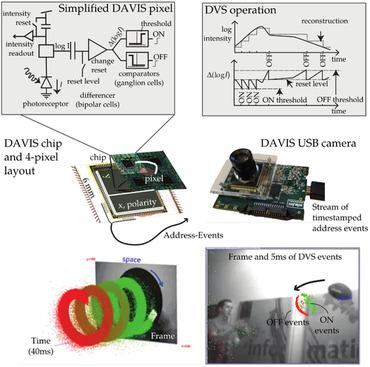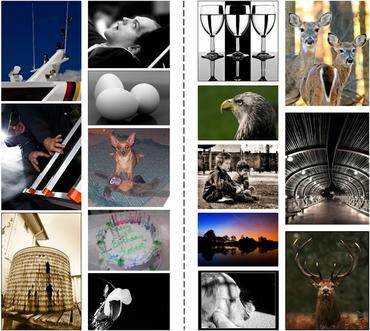Search Results for author: Leida Li
Found 26 papers, 10 papers with code
AesExpert: Towards Multi-modality Foundation Model for Image Aesthetics Perception
1 code implementation • 15 Apr 2024 • Yipo Huang, Xiangfei Sheng, Zhichao Yang, Quan Yuan, Zhichao Duan, Pengfei Chen, Leida Li, Weisi Lin, Guangming Shi
To address the above challenge, we first introduce a comprehensively annotated Aesthetic Multi-Modality Instruction Tuning (AesMMIT) dataset, which serves as the footstone for building multi-modality aesthetics foundation models.
Diffusion Model Based Visual Compensation Guidance and Visual Difference Analysis for No-Reference Image Quality Assessment
no code implementations • 22 Feb 2024 • Zhaoyang Wang, Bo Hu, Mingyang Zhang, Jie Li, Leida Li, Maoguo Gong, Xinbo Gao
Firstly, we devise a new diffusion restoration network that leverages the produced enhanced image and noise-containing images, incorporating nonlinear features obtained during the denoising process of the diffusion model, as high-level visual information.
AesBench: An Expert Benchmark for Multimodal Large Language Models on Image Aesthetics Perception
1 code implementation • 16 Jan 2024 • Yipo Huang, Quan Yuan, Xiangfei Sheng, Zhichao Yang, HaoNing Wu, Pengfei Chen, Yuzhe Yang, Leida Li, Weisi Lin
An obvious obstacle lies in the absence of a specific benchmark to evaluate the effectiveness of MLLMs on aesthetic perception.
Deep Shape-Texture Statistics for Completely Blind Image Quality Evaluation
no code implementations • 16 Jan 2024 • Yixuan Li, Peilin Chen, Hanwei Zhu, Keyan Ding, Leida Li, Shiqi Wang
The perceptual quality is quantified by the variant Mahalanobis Distance between the inner and outer Shape-Texture Statistics (DSTS), wherein the inner and outer statistics respectively describe the quality fingerprints of the distorted image and natural images.
Video Super-Resolution Transformer with Masked Inter&Intra-Frame Attention
1 code implementation • 12 Jan 2024 • Xingyu Zhou, Leheng Zhang, Xiaorui Zhao, Keze Wang, Leida Li, Shuhang Gu
The core of MIA-VSR is leveraging feature-level temporal continuity between adjacent frames to reduce redundant computations and make more rational use of previously enhanced SR features.
Dehazed Image Quality Evaluation: From Partial Discrepancy to Blind Perception
no code implementations • 22 Nov 2022 • Wei Zhou, Ruizeng Zhang, Leida Li, Hantao Liu, Huiyan Chen
Image dehazing aims to restore spatial details from hazy images.
HVS Revisited: A Comprehensive Video Quality Assessment Framework
no code implementations • 9 Oct 2022 • Ao-Xiang Zhang, Yuan-Gen Wang, Weixuan Tang, Leida Li, Sam Kwong
Based on the revisited HVS, a no-reference VQA framework called HVS-5M (NRVQA framework with five modules simulating HVS with five characteristics) is proposed.
 Ranked #6 on
Video Quality Assessment
on LIVE-FB LSVQ
Ranked #6 on
Video Quality Assessment
on LIVE-FB LSVQ
Ecsnet: Spatio-temporal feature learning for event camera
1 code implementation • IEEE Transactions on Circuits and Systems for Video Technology 2022 • Zhiwen Chen, Jinjian Wu, Junhui Hou, Leida Li, Weisheng Dong, Guangming Shi
To fully exploit their inherent sparsity with reconciling the spatio-temporal information, we introduce a compact event representation, namely 2D-1T event cloud sequence (2D-1T ECS).
 Ranked #1 on
Event data classification
on N-CARS
Ranked #1 on
Event data classification
on N-CARS
Seeking Subjectivity in Visual Emotion Distribution Learning
no code implementations • 25 Jul 2022 • Jingyuan Yang, Jie Li, Leida Li, Xiumei Wang, Yuxuan Ding, Xinbo Gao
In psychology, the \textit{Object-Appraisal-Emotion} model has demonstrated that each individual's emotion is affected by his/her subjective appraisal, which is further formed by the affective memory.
Personalized Image Aesthetics Assessment with Rich Attributes
no code implementations • CVPR 2022 • Yuzhe Yang, Liwu Xu, Leida Li, Nan Qie, Yaqian Li, Peng Zhang, Yandong Guo
To solve the dilemma, we conduct so far, the most comprehensive subjective study of personalized image aesthetics and introduce a new Personalized image Aesthetics database with Rich Attributes (PARA), which consists of 31, 220 images with annotations by 438 subjects.
Robust Depth Completion with Uncertainty-Driven Loss Functions
no code implementations • 15 Dec 2021 • Yufan Zhu, Weisheng Dong, Leida Li, Jinjian Wu, Xin Li, Guangming Shi
In this work, we introduce uncertainty-driven loss functions to improve the robustness of depth completion and handle the uncertainty in depth completion.
SOLVER: Scene-Object Interrelated Visual Emotion Reasoning Network
no code implementations • 24 Oct 2021 • Jingyuan Yang, Xinbo Gao, Leida Li, Xiumei Wang, Jinshan Ding
Inspired by this, we propose a novel Scene-Object interreLated Visual Emotion Reasoning network (SOLVER) to predict emotions from images.
StarVQA: Space-Time Attention for Video Quality Assessment
no code implementations • 22 Aug 2021 • Fengchuang Xing, Yuan-Gen Wang, Hanpin Wang, Leida Li, Guopu Zhu
To capture the long-range spatiotemporal dependencies of a video sequence, StarVQA encodes the space-time position information of each patch to the input of the Transformer.
A Circular-Structured Representation for Visual Emotion Distribution Learning
no code implementations • CVPR 2021 • Jingyuan Yang, Jie Li, Leida Li, Xiumei Wang, Xinbo Gao
Visual Emotion Analysis (VEA) has attracted increasing attention recently with the prevalence of sharing images on social networks.
Generalizable No-Reference Image Quality Assessment via Deep Meta-learning
1 code implementation • IEEE Transactions on Circuits and Systems for Video Technology 2021 • Hancheng Zhu, Leida Li, Jinjian Wu, Weisheng Dong, and Guangming Shi
Based on these two task sets, an optimization-based meta-learning is proposed to learn the generalized NR-IQA model, which can be directly used to evaluate the quality of images with unseen distortions.
Searching Efficient Model-guided Deep Network for Image Denoising
no code implementations • 6 Apr 2021 • Qian Ning, Weisheng Dong, Xin Li, Jinjian Wu, Leida Li, Guangming Shi
Similar to the success of NAS in high-level vision tasks, it is possible to find a memory and computationally efficient solution via NAS with highly competent denoising performance.
A new communication paradigm: from bit accuracy to semantic fidelity
no code implementations • 29 Jan 2021 • Guangming Shi, Dahua Gao, Xiaodan Song, Jingxuan Chai, Minxi Yang, Xuemei Xie, Leida Li, Xuyang Li
In this article, we deploy semantics to solve the spectrum and power bottleneck and propose a first understanding and then transmission framework with high semantic fidelity.
Networking and Internet Architecture
Unsupervised Curriculum Domain Adaptation for No-Reference Video Quality Assessment
1 code implementation • ICCV 2021 • Pengfei Chen, Leida Li, Jinjian Wu, Weisheng Dong, Guangming Shi
From this adaptation, we split the data in target domain into confident and uncertain subdomains using the proposed uncertainty-based ranking function, through measuring their prediction confidences.
Cuid: A new study of perceived image quality and its subjective assessment
no code implementations • 28 Sep 2020 • Lucie Lévêque, Ji Yang, Xiaohan Yang, Pengfei Guo, Kenneth Dasalla, Leida Li, Yingying Wu, Hantao Liu
It is thus critical to acquire reliable subjective data with controlled perception experiments that faithfully reflect human behavioural responses to distortions in visual signals.
Accurate and Lightweight Image Super-Resolution with Model-Guided Deep Unfolding Network
no code implementations • 14 Sep 2020 • Qian Ning, Weisheng Dong, Guangming Shi, Leida Li, Xin Li
Deep neural networks (DNNs) based methods have achieved great success in single image super-resolution (SISR).
Personalized Image Aesthetics Assessment via Meta-Learning With Bilevel Gradient Optimization
1 code implementation • IEEE Transactions on Cybernetics 2020 • Hancheng Zhu, Leida Li, Jinjian Wu, Sicheng Zhao, Guiguang Ding, and Guangming Shi
Typical image aesthetics assessment (IAA) is modeled for the generic aesthetics perceived by an ``average'' user.
MetaIQA: Deep Meta-learning for No-Reference Image Quality Assessment
1 code implementation • CVPR 2020 • Hancheng Zhu, Leida Li, Jinjian Wu, Weisheng Dong, Guangming Shi
The underlying idea is to learn the meta-knowledge shared by human when evaluating the quality of images with various distortions, which can then be adapted to unknown distortions easily.
PDANet: Polarity-consistent Deep Attention Network for Fine-grained Visual Emotion Regression
1 code implementation • 11 Sep 2019 • Sicheng Zhao, Zizhou Jia, Hui Chen, Leida Li, Guiguang Ding, Kurt Keutzer
By optimizing the PCR loss, PDANet can generate a polarity preserved attention map and thus improve the emotion regression performance.
Incremental Few-Shot Learning for Pedestrian Attribute Recognition
no code implementations • 2 Jun 2019 • Liuyu Xiang, Xiaoming Jin, Guiguang Ding, Jungong Han, Leida Li
Pedestrian attribute recognition has received increasing attention due to its important role in video surveillance applications.
Semantic Adversarial Network for Zero-Shot Sketch-Based Image Retrieval
no code implementations • 7 May 2019 • Xinxun Xu, Hao Wang, Leida Li, Cheng Deng
Zero-shot sketch-based image retrieval (ZS-SBIR) is a specific cross-modal retrieval task for retrieving natural images with free-hand sketches under zero-shot scenario.
Image Quality Assessment Guided Deep Neural Networks Training
3 code implementations • 13 Aug 2017 • Zhuo Chen, Weisi Lin, Shiqi Wang, Long Xu, Leida Li
For many computer vision problems, the deep neural networks are trained and validated based on the assumption that the input images are pristine (i. e., artifact-free).














